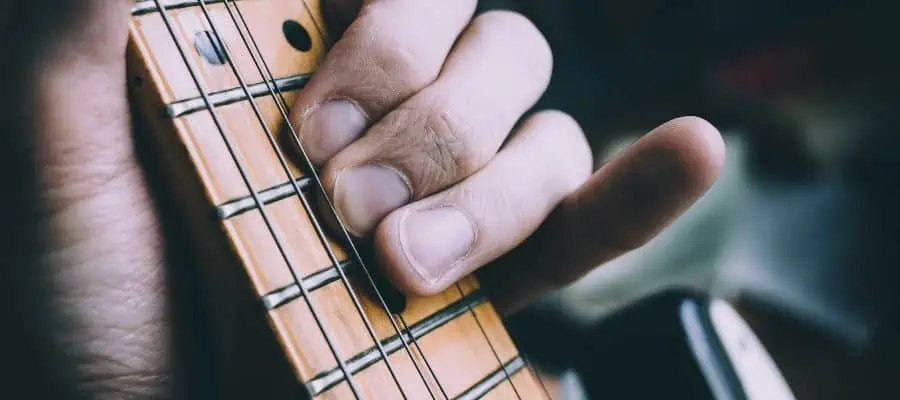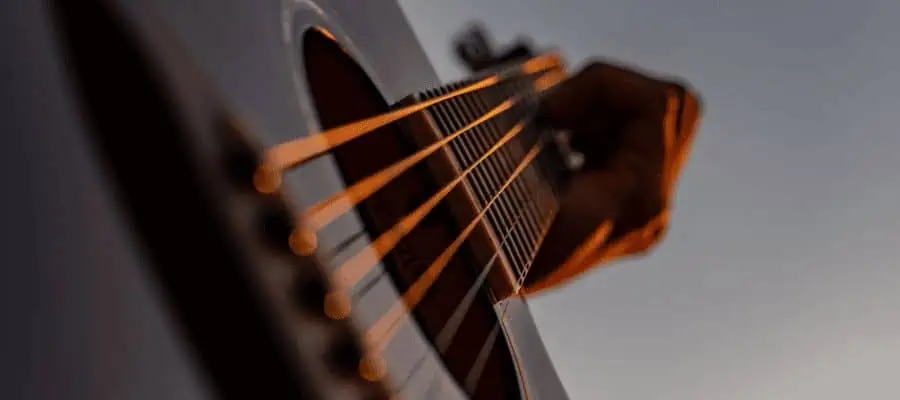If you have played guitar for a while, you may have encountered zero-fret guitars with their odd design. Zero-fret guitars feature an additional fret positioned at the top of the neck, where the nut is usually found.
This design choice ensures that open strings have a consistent tone with the fretted notes due to the strings contacting a metal fret rather than a nut made of bone, plastic, or other materials. This consistency makes the zero fret an intriguing element to many guitarists and luthiers.
Also, a zero fret allows for a more straightforward setup and better playability for beginners, as it can lower the action of the strings without the complications of nut adjustment. Additionally, some argue that using zero fret improves tuning stability and intonation across the fretboard.
While not as common as the more traditional nut, several guitar manufacturers who appreciate its unique advantages have adopted the zero fret. Whether you’re a seasoned player or new to the guitar, understanding the reasons behind the zero fret’s existence could provide insight into the subtle nuances that affect a guitar’s playability and sound.
Fundamentals of Zero Fret Guitars

Zero-fret guitars incorporate a unique feature that sets them apart from traditional guitar designs, offering distinct benefits for playability and tone. A zero fret lies directly in front of the nut and serves as the starting point of the fretboard, affecting string height and tone consistency.
Understanding the Zero Fret
The zero fret is situated where a nut would typically be found on a guitar, but instead of the strings resting on the nut to determine their height, they rest on the zero fret. This metal fret is an extension of the other frets on the guitar’s neck, lined up with them and made from the same material. Here’s what the zero fret does for you:
- Consistent Tone: The zero fret ensures that open strings sound more like fretted notes, providing a uniform tonal quality across the fretboard.
- Optimal String Height: Because the zero fret is a precise height, it sets the strings at an optimal distance from the fretboard, making playing smoother and reducing buzzing.
- Simplified Manufacturing: Having a zero fret reduces the complexity of nut fabrication, as the zero fret takes on the crucial role of determining the string height, leaving the nut responsible mainly for spacing and alignment.
Advantages of Zero Fret Guitars

Zero-fret guitars are designed to ensure a seamless playing experience and consistent sound quality. They address common issues in traditional guitars, such as varying string action and tonal differences between open and fretted notes. By incorporating a zero fret, these guitars provide numerous benefits to enhance your playing.
Consistency in Action
A guitar’s action refers to the distance between the strings and the fretboard. A zero fret guarantees consistent action across all strings—eliminating the variable height that can occur at the nut. This makes an even feel when transitioning from open strings to fretted notes.
Tonal Benefits
Zero-fret guitars offer a distinctive advantage in tone. The zero fret ensures open strings ring with a similar quality to fretted notes, creating cohesive sound characteristics across the fretboard.
Easier Playability
Chords and notes, particularly those near the nut, can be easier to play on a zero-fret guitar. The reduced variation in string height near the nut minimizes the effort required to press down on the first few frets. This can lead to less strain on your fingers and a more comfortable playing experience.
By understanding these advantages, you can better appreciate why zero-fret guitars exist and how they can improve your playing experience.
Considerations When Choosing a Zero Fret Guitar

Understanding the differences and practicalities is crucial when you’re in the market for a guitar with zero fret. The zero fret serves as a benchmark for string height and can affect playability and tone, but there are factors regarding maintenance and longevity that you should take into account.
Compared to Standard Nut Guitars
- Tonal Consistency: A zero fret can offer a more uniform level of sustain and tone across open and fretted notes when compared with standard nut guitars.
- Ease of Play: For some players, zero-fret guitars facilitate easier chord transitions, especially near the nut, as the zero-fret sets the string action and potentially reduces finger strain.
Maintenance and Durability
- Wear and Tear: Since the zero fret takes the role of the nut in determining string height, it may wear out more quickly than a traditional nut due to constant string pressure and movement.
- Maintenance: Consider the potential need for more frequent leveling or replacement of the zero frets compared to a standard nut, which typically requires less frequent attention.
Conclusion
A zero fret on some guitars is functional in enhancing the uniformity of tone between open and fretted strings. It may be an appealing feature if consistent tonality is high on your list of priorities. Whether you’re a beginner seeking ease of play or an experienced guitarist looking for that slight edge in sound quality, the zero fret might benefit you.
- Tonal uniformity: A zero fret ensures that open strings sound like fretted notes.
- Ease of play: For beginners, it can simplify the guitar’s action setup.
- Personal preference: Though not universally adopted, it remains a choice for you to consider based on desired sound and playability.
Remember that the zero fret is just one aspect of a guitar’s overall design and may not be the deciding factor in your instrument’s quality. Its utility is a matter of personal preference and playing style. As guitar craftsmanship continues to evolve, the zero fret remains an option rather than a standard, reminding you that variety in instrument design exists to cater to a diversity of tastes.
If you found this article useful, you may want to save this pin below to your Guitar board.

Recent Posts
Some guitarists insist on buying an expensive amplifier with their electric guitar. They assume that this is a must for every type of guitarist out there. However, in some situations, this isn’t...
Top 50 Free Realistic Guitar VST Plugins With Sound Examples
As technology has rapidly advanced in the recent decade, computers are stealing more and more roles from physical musical instruments and accessories. Nowadays, you do not need expensive amps,...

